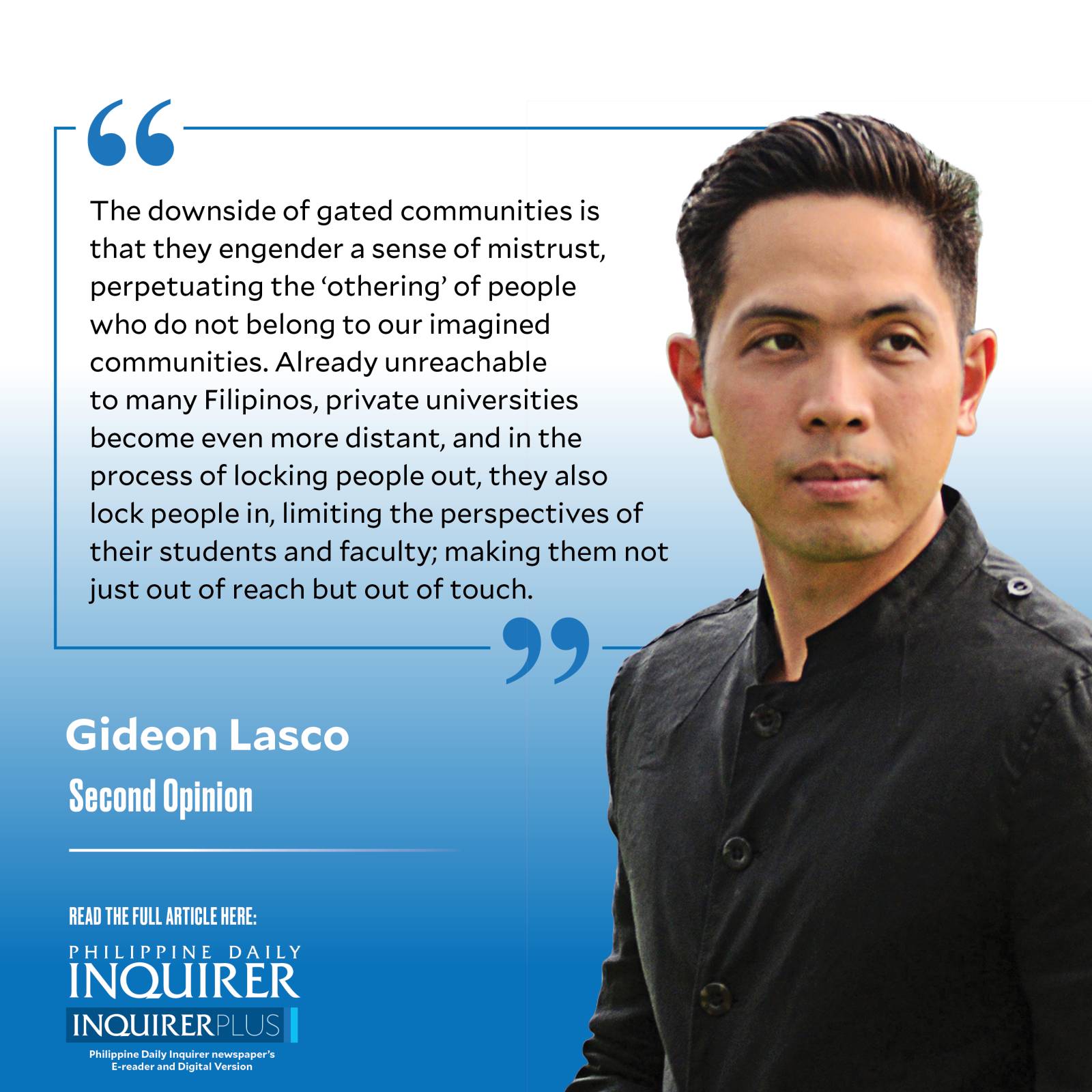Interrogating our ‘gated community’ mindset

From office buildings and hotels to residential villages and even university campuses, places in the Philippines are incredibly difficult to enter—a valid ID, a car sticker, a gate pass, a walk-through metal detector, a baggage x-ray machine, an authorization from someone: the more “elite” the institution, the more steps one has to take to be let in. And most of the time, we do not see this as a bad thing, hence the positive connotation and appeal of the idea of a “gated community.”
This idea of safety inside cemented high walls, barbed-wire fences, iron gates, and other security apparatus can possibly be traced to the colonial period when the Spanish colonial administrators forcibly brought the indios within city confines (bajo el toque de la campana; under the peal of the [church] bell) so they can be easily controlled.
Given how colonialism—which included the Pacific slave trade in the 16th and 17th century—also created a wedge between Christianized lowland areas and other inhabitants in the Philippines, from highland societies to seafaring Moros, the cities also offered relative safety even as they were not immune to attacks.
The threat of crime and violence, both actual and perceived, has lingered in our societal imagination, perpetuated by “moral panics” over, for instance, the kidnapping scares and dramatic rape cases of the 1990s and the constant hyping up of drugs as an exceptional, existential threat to the country.
In places like Davao City where leaders have appealed to people’s sense of fear and their felt need for protection against crime (in other words, penal populism), checkpoints serve to dramatize a sense of safety. And, of course, homeowners associations also look for the sense of security, especially with reports of theft and other crimes.
Thus, the appeal of “gated communities”—plus the fact that for many Filipinos, they remain an important symbol not just of one’s status but of success in one’s career.
Gated communities are not unique to the Philippines. In Indonesia, scholars identify “lifestyle, prestige, security” as motivations for people to desire them (see Leisch, 2002), resonating with the account of Ortega and Katigbak (2022) of how homes in gated villages are “‘trophies’ of the migration experience” among Filipinos. In the United States, anthropologist Setha Low (2001) wrote of gated communities as having been built “to protect family estates and wealthy citizens” at the turn of the 20th century, eventually expanding as an “emerging social phenomenon of white, middle-class people retreating to new, walled private communities” in the 1990s.
Perhaps what’s unique is the pervasiveness of this phenomenon in our country. Even with the threat of school shootings in the US, campuses have remained open—you can easily walk into Harvard Yard and even enter its buildings. In contrast, in Ateneo de Manila University, visitors have to book an appointment in advance and even within the same campus, one needs additional authorization to go to other buildings. Numerous gates and checkpoints abound elsewhere, making valid IDs essential—and further exclusionary (see “Our fetish for valid IDs,” 07/22/22).
Now, I do not seek to downplay the need for security, nor to dismiss the trauma over past events that led to such responses. Indeed, violence is an everyday reality for many Filipinos, and while empathy for others is always in short supply—think of Jemboy Baltazar—the impulse to protect one’s family and community is ever present and fully understandable. From an organizational standpoint, there is a cost in opening up in the public; University of the Philippine Los Baños’ Vice Chancellor Roberto Cereno, for instance, laments the amount of trash they have to deal with after each weekend.
We have to ask ourselves, however, whether certain responses are commensurate to the threat—or we are just letting our overprotectiveness take root. During the COVID-19 pandemic, our response was also to make gated communities out of every village, every barangay, every university, until we realized, much belatedly, that many such responses were not warranted, and that they had negative consequences, too—not least of which was what I called “[t]he unbearable lockdown of Filipino children,” (11/19/21).
The downside of gated communities is that they engender a sense of mistrust, perpetuating the “othering” of people who do not belong to our imagined communities. Already unreachable to many Filipinos, private universities become even more distant, and in the process of locking people out, they also lock people in, limiting the perspectives of their students and faculty; making them not just out of reach but out of touch. As Low warned, “adding walls, gates, and guards produces a landscape that encodes class relations and residential … segregation more permanently in the built environment.”
Given the many gates we have built around ourselves, it should not come as a surprise that many of us are incapable of empathizing with those who are outside. I completely understand why many Filipinos dream of living in gated communities, but if we are to be a nation, we need to build more bridges, not walls.
—————–
glasco@inquirer.com.ph




















